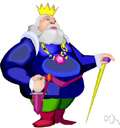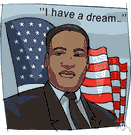king
(kĭng)n.
1. A male sovereign.
2.
a. One that is supreme or preeminent in a particular group, category, or sphere: "In many countries, soccer is the king of sports" (Cameron W. Barr).
b. A man chosen as the winner of a contest or the honorary head of an event: a homecoming king.
3. Games
a. Abbr. K A playing card bearing the figure of a king, ranking above a queen.
b. Abbr. K The principal chess piece, which can move one square in any direction and must be protected against checkmate.
c. A piece in checkers that has been moved to the last row on the opponent's side of the board and been crowned, thus becoming free to move both forward and backward.
4. Kings(used with a sing. verb) See Table at Bible.
5. A king-size bed.
adj.
1. Principal or chief, as in size or importance.
2. Of or relating to a king-size bed: king sheets; a king bed skirt.
tr.v. kinged, king·ing, kings Games
To make (a piece in checkers) into a king; crown.
American Heritage® Dictionary of the English Language, Fifth Edition. Copyright © 2016 by Houghton Mifflin Harcourt Publishing Company. Published by Houghton Mifflin Harcourt Publishing Company. All rights reserved.
king
(kɪŋ)n
1. (Government, Politics & Diplomacy) a male sovereign prince who is the official ruler of an independent state; monarch.
2.
a. a ruler or chief: king of the fairies.
b. (in combination): the pirate king.
3.
a. a person, animal, or thing considered as the best or most important of its kind
b. (as modifier): a king bull.
4. (Card Games) any of four playing cards in a pack, one for each suit, bearing the picture of a king
5. (Chess & Draughts) the most important chess piece, although theoretically the weakest, being able to move only one square at a time in any direction. See also check30, checkmate
6. (Chess & Draughts) draughts a piece that has moved entirely across the board and has been crowned, after which it may move backwards as well as forwards
7. king of kings
a. God
b. a title of any of various oriental monarchs
vb (tr)
8. to make (someone) a king
9. king it to act in a superior fashion
[Old English cyning; related to Old High German kunig king, Danish konge]
ˈkingˌhood n
ˈkingless adj
ˈkingˌlike adj
King
(kɪŋ)n
1. (Biography) B.B., real name Riley B. King. born 1925, US blues singer and guitarist
2. (Biography) Billie Jean (née Moffitt). born 1943, US tennis player: winner of twelve Grand Slam singles titles, including Wimbledon (1966–68, 1972–73, and 1975) and the US Open (1967, 1971–72, and 1974)
3. (Biography) Martin Luther. 1929–68, US Baptist minister and civil-rights leader. He advocated nonviolence in his campaigns against the segregation of Black people in the South: assassinated: Nobel Peace Prize 1964
4. (Biography) Mervyn (Allister). Baron. born 1948, British banker; governor of the Bank of England (2003–13); a cross-bench peer in the House of Lords from 2013
5. (Biography) Stephen (Edwin). born 1947, US writer esp of horror novels; his books, many of which have been filmed, include Carrie (1974), The Shining (1977), Misery (1988), and Everything's Eventual (2002)
6. (Biography) William Lyon Mackenzie. 1874–1950, Canadian Liberal statesman; prime minister (1921–26; 1926–30; 1935–48)
Collins English Dictionary – Complete and Unabridged, 12th Edition 2014 © HarperCollins Publishers 1991, 1994, 1998, 2000, 2003, 2006, 2007, 2009, 2011, 2014
king
(kɪŋ)n.
1. a male sovereign or monarch; a man who holds by life tenure, and usu. by hereditary right, the chief authority over a country and people.
2. a person or thing preeminent in its class: the king of actors.
3. a playing card bearing a picture of a king.
4. the chief chess piece of each color, whose checkmating is the object of the game: moved one square at a time in any direction.
5. a checker piece that has been moved entirely across the board and has been crowned, thus allowing it to be moved in any direction.
v.t. 6. to make a king of; crown.
adj. 7. large; king-size.
8. preeminent.
[before 900; Middle English; Old English cyng, cyni(n)g, c. Old Saxon kuning, Old High German chunning; akin to Old Norse konungr]
king′hood, n.
king′like`, adj.
King
(kɪŋ)n.
1. Martin Luther, Jr., 1929–68, U.S. Baptist minister: civil-rights leader; Nobel peace prize 1964.
2. William Lyon Mackenzie, 1874–1950, prime minister of Canada 1921–26, 1926–30, 1935–48.
3. William Rufus DeVane, 1786–1853, vice president of the U.S. 1853.
Random House Kernerman Webster's College Dictionary, © 2010 K Dictionaries Ltd. Copyright 2005, 1997, 1991 by Random House, Inc. All rights reserved.
king
Past participle: kinged
Gerund: kinging
| Imperative |
|---|
| king |
| king |
Collins English Verb Tables © HarperCollins Publishers 2011
ThesaurusAntonymsRelated WordsSynonymsLegend:
| Noun | 1. |  king - a male sovereign; ruler of a kingdom king - a male sovereign; ruler of a kingdomroyal family, royal house, royal line, royalty - royal persons collectively; "the wedding was attended by royalty" King of England, King of Great Britain - the sovereign ruler of England King of France - the sovereign ruler of France King of the Germans - the sovereign ruler of the Germans |
| 2. | king - a competitor who holds a preeminent position challenger, competitor, contender, rival, competition - the contestant you hope to defeat; "he had respect for his rivals"; "he wanted to know what the competition was doing" | |
| 3. |  king - a very wealthy or powerful businessman; "an oil baron" king - a very wealthy or powerful businessman; "an oil baron"businessman, man of affairs - a person engaged in commercial or industrial business (especially an owner or executive) oil tycoon - a powerful person in the oil business | |
| 4. | king - preeminence in a particular category or group or field; "the lion is the king of beasts" eminence, preeminence, distinction, note - high status importance owing to marked superiority; "a scholar of great eminence" | |
| 5. | King - United States woman tennis player (born in 1943) | |
| 6. |  King - United States guitar player and singer of the blues (born in 1925) King - United States guitar player and singer of the blues (born in 1925) | |
| 7. |  King - United States charismatic civil rights leader and Baptist minister who campaigned against the segregation of Blacks (1929-1968) King - United States charismatic civil rights leader and Baptist minister who campaigned against the segregation of Blacks (1929-1968) | |
| 8. | king - a checker that has been moved to the opponent's first row where it is promoted to a piece that is free to move either forward or backward | |
| 9. | king - one of the four playing cards in a deck bearing the picture of a king | |
| 10. | king - (chess) the weakest but the most important piece chess game, chess - a board game for two players who move their 16 pieces according to specific rules; the object is to checkmate the opponent's king chess piece, chessman - any of 16 white and 16 black pieces used in playing the game of chess |
Based on WordNet 3.0, Farlex clipart collection. © 2003-2012 Princeton University, Farlex Inc.
king
noun
a king's ransom fortune, packet, large sum of money, top dollar (informal) clients happy to pay a king's ransom for a haircut
Related words
adjectives royal, regal, monarchical
adjectives royal, regal, monarchical
Quotations
"I know I have the body of a weak and feeble woman, but I have the heart and stomach of a king, and of a king of England too" [Queen Elizabeth I]
"I know I have the body of a weak and feeble woman, but I have the heart and stomach of a king, and of a king of England too" [Queen Elizabeth I]
Collins Thesaurus of the English Language – Complete and Unabridged 2nd Edition. 2002 © HarperCollins Publishers 1995, 2002
Translations
الريَّه او الشايِب في ورق اللعِبالشاه في لُعْبَة الشَّطْرَنْجمَلِكمَلِكٌ
král
konge
reĝo
kuningas
kuningas
kralj
király
raja
kóngurkonungur
キング王
왕
rex
karaliuskaralystėpasaulistulžyskaraliaus
karalis
kongekong
rege
kráľ
kralj
краљпоп
kung
mfalme
พระเจ้าแผ่นดิน
vuaquốc vương
king
[kɪŋ]A. N
1. (lit, fig) → rey m
the king and queen → los reyes
the Three Kings → los Reyes Magos
an oil king → un magnate del petróleo
I'm the king of the castle! (child language) → ¡soy el rey!, ¡soy el amo y señor!
to turn King's evidence → delatar a los cómplices
they paid a king's ransom for it → les costó mucho dinero, les costó un dineral
to live like a king → vivir a cuerpo de rey
the king and queen → los reyes
the Three Kings → los Reyes Magos
an oil king → un magnate del petróleo
I'm the king of the castle! (child language) → ¡soy el rey!, ¡soy el amo y señor!
to turn King's evidence → delatar a los cómplices
they paid a king's ransom for it → les costó mucho dinero, les costó un dineral
to live like a king → vivir a cuerpo de rey
Collins Spanish Dictionary - Complete and Unabridged 8th Edition 2005 © William Collins Sons & Co. Ltd. 1971, 1988 © HarperCollins Publishers 1992, 1993, 1996, 1997, 2000, 2003, 2005
king
[ˈkɪŋ] nCollins English/French Electronic Resource. © HarperCollins Publishers 2005
king
n
king
:kingbolt
n (US) = kingpin
king crab
n → Königskrabbe f
kingcup
king
:kingmaker
n (lit, fig) → Königsmacher(in) m(f)
kingpin
n (Tech) → Königsbolzen m, → Drehzapfen m; (Aut) → Achsschenkelbolzen m; (fig: = person) → Stütze f; he’s the king of the whole organization → mit ihm steht und fällt die ganze Organisation
king prawn
n → Königskrabbe f
King’s Bench
n (Jur) erste Kammer des Obersten Gerichts in Großbritannien
King’s Counsel
n (Jur) → Kronanwalt m → /-anwältin f (Staatsanwalt, der in höheren Strafsachen die Krone vertritt)
King’s English
n → englische Hochsprache
kingship
n → Königtum nt
King’s highway
n (Brit) → öffentliche Straße
king-size(d)
adj (inf) → in Großformat, großformatig; cigarettes → King-size; bed → extra groß; I’ve got a king headache (hum) → ich hab vielleicht einen Brummschädel (inf) → or einen dicken Kopf (inf)
king’s messenger
n (Diplomacy) → königlicher Gesandter
King’s speech
n → Thronrede f
Collins German Dictionary – Complete and Unabridged 7th Edition 2005. © William Collins Sons & Co. Ltd. 1980 © HarperCollins Publishers 1991, 1997, 1999, 2004, 2005, 2007
Collins Italian Dictionary 1st Edition © HarperCollins Publishers 1995
king
(kiŋ) noun1. a male ruler of a nation, who inherits his position by right of birth. He became king when his father died; King Charles III.
2. the playing-card with the picture of a king. I have two cards – the ten of spades and the king of diamonds.
3. the most important piece in chess.
ˈkingdom noun1. a state having a king (or queen) as its head. The United Kingdom of Great Britain and Northern Ireland; He rules over a large kingdom.
2. any of the three great divisions of natural objects. the animal, vegetable and mineral kingdoms.
ˈkingly adjective of, relating to, or suitable for a king. kingly robes; a kingly feast.
ˈkingliness nounˈkingfisher noun
a type of bird with brilliant blue feathers which feeds on fish.
ˈking-size(d) adjective of a large size; larger than normal. a king-size(d) bed; king-size cigarettes.
Kernerman English Multilingual Dictionary © 2006-2013 K Dictionaries Ltd.
king
→ مَلِكٌ král konge König βασιλιάς rey kuningas roi kralj re 王 왕 koning konge król rei король kung พระเจ้าแผ่นดิน kral vua 国王Multilingual Translator © HarperCollins Publishers 2009